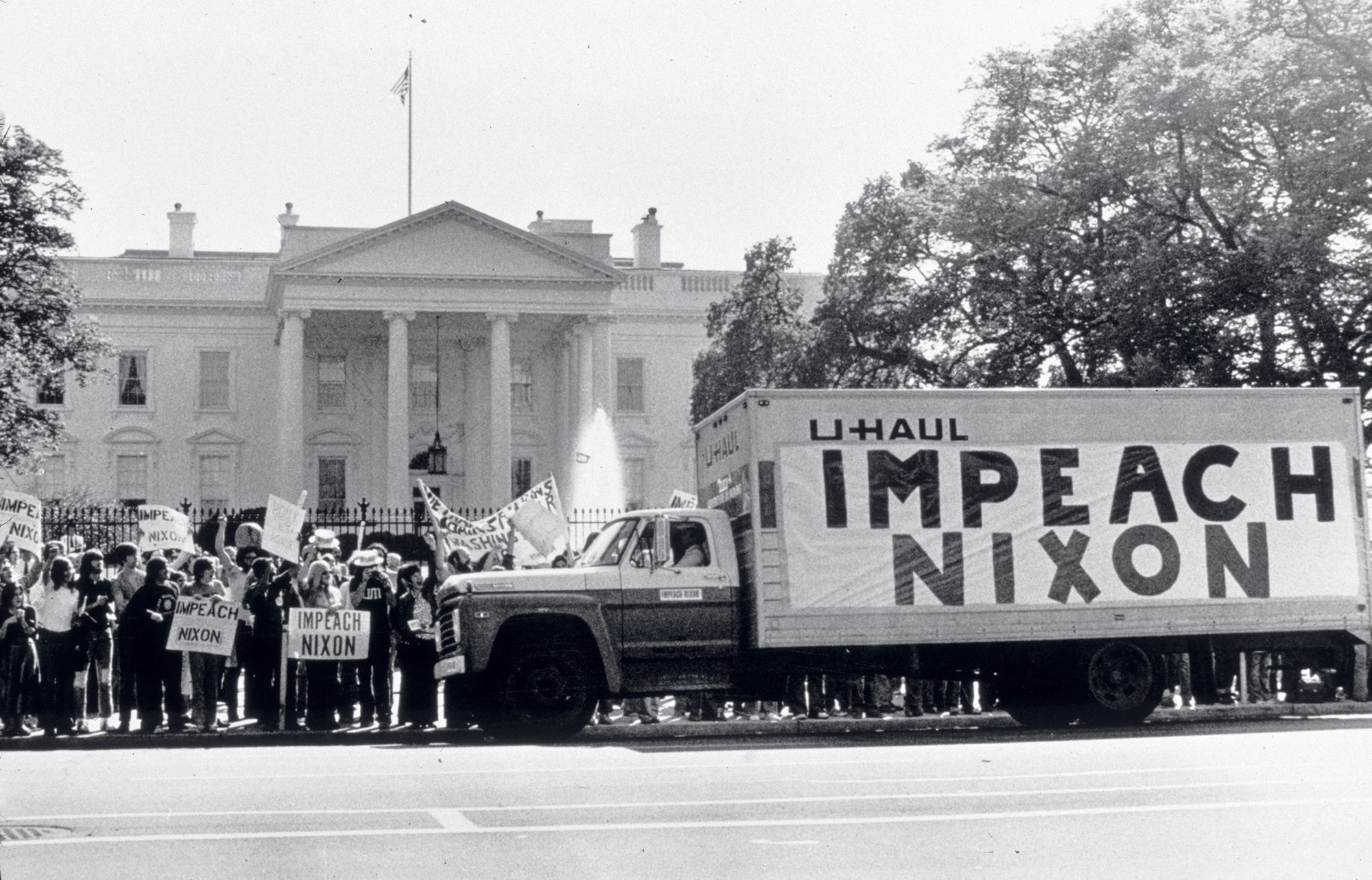The Trump administration has been a boon to the media, with information junkies sucking up every scrap of breaking news. But it has also provided a big boost to a less expected journalistic endeavor: Elizabeth Drew’s 1975 book, Washington Journal: Reporting Water-gate and Richard Nixon’s Downfall, which was republished in 2014 and has since earned a reputation as a key historical reference text of the Donald Trump era. The book is a collection of Drew’s New Yorker dispatches from 1973 and 1974—cool, laconic accounts of the Watergate impeachment proceedings that have obvious newfound relevance.
At 81, Drew is still plugged into DC political-class chatter, but her career is in a bit of flux. She recently announced her separation from her longest-running outlet, the New York Review of Books. Her work now appears on the Project Syndicate website.
We stopped by Drew’s art-filled Georgetown home to talk about the similarities between Trump and Nixon, and how Washington has evolved since Watergate.
Nixon resigned on August 9, 1974, and your article about it appeared in the New Yorker’s October 28 issue that year. Your New York Review of Books analysis of Trump’s election appeared a week after the events, online. Has digital journalism made a difference in how you work?
No real difference that I can think of. I’m a relatively fast writer, and then I go over it and over it. I polish and polish and polish. Which is the beauty of laptops. I’m so old, I remember when you had to deal with Wite-Out and carbon paper.
Do you watch the natterers on cable?
I do, though I usually do something else while they’re on. It’s part of the gathering process. You learn the zeitgeist. You pick up a fact here, or an insight. With Trump, there is no break. It’s not like you wait for a speech or this or that event. Something is always going on. He’s really a full-time occupation.
So many journalism careers were made during Watergate. Are there people now who you think are doing a particularly good job?
There’s some excellent newspaper work. It’s not so much about the television anchor now. We don’t have Walter Cronkite to tell us what God thinks, according to him.
Among the print journalists, Maggie Haberman at the New York Times is phenomenal. She’s always going, and she always has stuff. Bob Costa and Phil Rucker at the Washington Post—they are young guys who are good writers.
How is Trump different from Nixon?
Nixon knew government. He was interested in policy. You could have a coherent conversation with Nixon about the substance of something. With Trump, it’s all over the place. You don’t know what’s going to come out of him. He’s on another loop than the rest of us, and it makes him fascinating. He’s so unusual and unpredictable—he’s frightening.
It was scarier under Nixon in a different way. Nixon knew how to manipulate the instruments of government to fight his perceived enemies. He was paranoid. But because he and his henchmen—which is what they felt like—knew how to manipulate strings, it was scary. If you were talking on the phone and you heard a click, you’d say, “Are they taping us?” If a car was parked outside your house for more than 24 hours, you’d say, “What’s going on?”
Trump doesn’t do that for us. It’s a fright that he doesn’t know what he’s doing. Is he going to get us blown up? It’s the encouragement of violence at his rallies, it’s Charlottesville.
I suppose the real question is: How are they similar? What about Trump has made people go back to your Watergate book?
I don’t think it’s about Trump per se. The heart of the issue is whether we can hold a President accountable, and Nixon is the example.
Frankly, I think there are impeachable offenses that Trump has committed. I don’t know if there will be an impeachment, because it’s the Republicans who will have to decide, but I don’t rule it out. Maybe he resigns if this is closing in on his family and him. Anything can happen.

Could you imagine back in the ’70s that in 2017 people would still be reading your writing on Nixon?
After I got the assignment, my great mentor, [former Secretary of Health, Education, and Welfare and founder of the government-ethics watchdog Common Cause] John Gardner, and I had lunch, and he said, “Elizabeth, write it so that 40 years from now people can read it and say, ‘So that’s what it was like.’ ” It didn’t affect the writing, but he foresaw what this could amount to.
The book came out and did fine. It did well. In 2014, I added an epilogue and we brought out a new edition for the 40th anniversary of the resignation. Then this happened. Donald Trump gave it a new life.
In your New Yorker account of Nixon’s resignation, you wrote, “One has to think again about what this story would have been like tapeless.” What would the Trump story be like without Twitter?
With Nixon, [media] was almost primitive. I feel like I’m talking about the stagecoach days. We had a morning newspaper and an afternoon paper, the Washington Star. That was it—and thank God. It was full-time back then, but it wasn’t as thick as it is now. There were a lot of scenes of “Did you hear the latest?” You could see it go from table to table at restaurants. Now you can’t get away from it. Earlier this summer, I found myself in the dentist’s chair and the guy wanted to talk about Trump. I thought I was going to scream.
Did it seem like there was more leaking back then or less?
There’s a lot of leaking now. It’s people cleaning their skirts. I’ve never seen a White House like this. Nixon’s aides were loyal to him. You have people in the Trump White House saying—and maybe believing—that if they weren’t there, things would be worse.
How has DC itself changed?
There was a less partisan Washington. There is no center now, or it’s so tiny it can’t have any effect. It’s far more ideological.
There was a big change after Newt Gingrich came in as speaker of the House in 1994. Before, you could go to a senator’s house for dinner and members of the other party would be there. They socialized. They could be friends. Now there’s much less cohesion. Newt changed the ambience.
Is there less of a sense of humor in Washington these days?
Oh, I don’t know. It depends on whether you think these guys are funny or scary or both. With Trump it’s the ludicrousness of this man who has no more business being President than I do.
This interview has been edited and condensed.
This article appears in the November 2017 issue of Washingtonian.


















